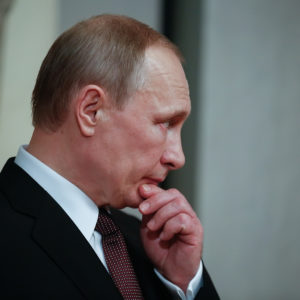In a move reminiscent of Adolf Hitler’s need for Lebensraum, Russian President Vladimir Putin is exhibiting an egomaniacal desire to regain the glory of the vast empire of the Soviet Union. There’s little else to explain his actions.
Putin controls executive, legislative, and judicial branches of government. He also controls television, print, and online media. He’s the undisputed dictator of the economy to whatever extent he chooses.
What’s left for him? He now wants a Soviet-style dictatorship, the one that he wept for the day the wall fell in Berlin where he was based as a KGB leader, that has him surrounded by Russian puppets.
In 2014, he invaded Ukraine’s easternmost region.
He also manipulated a “public referendum” in Crimea that allegedly resulted in “97 percent of residents voting in favor of secession” from Ukraine.
He likely envisioned a total collapse of Ukraine’s government, but when that did not happen, he settled on installing local leaders in the regions he gained.
What he seems to be up to now is merely the continuation of his initial effort in Ukraine in the hopes that it ends with a fawning, obedient government in Kyiv — and then onto the next conquest.
One limiting factor, hence the need to move quickly, is that taking over NATO members would prove a bridge too far even for Putin. Ukraine’s possible membership in NATO would almost permanently make invasion far too painful.
It is not at all assured that Ukraine is likely to gain membership in NATO. No matter, the possibility alone is enough to drive this action. (Ukraine’s leadership does indeed aspire to NATO membership).
We should note that Ukraine poses no independent threat to Russia. Ukraine has not acted in any way that indicates military, economic or other actions against Russia. This entire affair is a Putin invention.
Putin is also in need of ego-stroking and taking action that would adversely affect the relative respect of NATO nations, especially the U.S. of course, would boost his delusional need for increased power.
It remains to be seen what kind of response the West, and again, especially the U.S., would offer should Russia invade. But, in no case would such a move engender marked advancement of Putin’s image abroad. He would face widespread disdain from almost all nations, save China, a nation also led by a tyrannical regime. It is possible he does not care.
Major exercises in Belarus could clearly lead to a Russian invasion of Ukraine and that movement is the quickest, shortest route to Kyiv.
Troops from Russia proper are available in the northeast and could pour in as follow-on forces in an endless stream. Forces based in the aforementioned Crimea are available from the south. Ships in the Black Sea can attack without hope of being repelled by Ukraine.
At least 130,000 Russian forces in the area stand at the ready, and there are many more that could be moved to Ukraine with ease.
The U.S. has said an attack is coming. The announcement was likely an attempt to thwart a false-flag attack that Russia would use to precipitate an attack (see Hitler’s use of fake Polish troops used to stage an attack that led to an invasion and ultimately draw the world into a calamitous war).
That is where things stand.
What would Putin do after an invasion, assuming a quick victory and occupation (although a quick win is not assured)?
His likely aim is not to move Ukraine immediately into the fold of Russia.
He would want to install his kind of leaders in Kyiv and throughout the country and then slowly withdraw all but a small contingent of Russian troops. His goal is control, not direct ownership. We have seen this scenario before.
Putin has the clear advantage of location, military might available, and the secure knowledge of the already stated limits by the west (i.e. no troops to support Ukraine) on what can happen. Whether he believes economic or diplomatic sanctions or if he believes their potential impact on his country is unknown.
No attack is inevitable, but the world watches as a tyrant readies his force.

